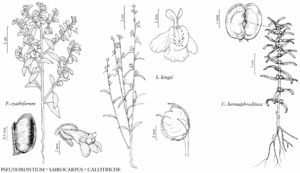Callitriche hermaphroditica
Cent. Pl. I, 31. 1755.
Leaves not connate at base, ± linear, tapering from base, (7–)7.6–11.5 × 0.9–1.4 mm, 1-veined. Stem and leaf scales absent. Inflorescences: bracts absent. Pedicels 0 mm in fruit. Flowers solitary; styles erect, later recurved; pollen colorless. Schizocarps 1.1–1.9 × 1.2–2.4 mm, shorter than or as long as wide, sometimes longer than wide; mericarps dark brown, not swollen, winged throughout, wings straight, 0.2–0.8 mm wide, as wide as or wider than mericarp body. 2n = 6.
Phenology: Flowering Jul–Sep(–Nov).
Habitat: Lakes, ponds, backwaters, ditches.
Elevation: 0–3000 m.
Distribution
Greenland, Alta., B.C., Nfld. and Labr. (Nfld.), N.W.T., Ont., Que., Sask., Alaska, Colo., Idaho, Mont., Nebr., N.J., N.Y., Oreg., Utah, Vt., Wis., Wyo., Eurasia.
Discussion
Infraspecific divisions have been based on the size of fruit (for example, R. V. Lansdown 2006); assignment of North American populations to these taxa would be premature.
Callitriche autumnalis Linnaeus is a superfluous renaming of C. hermaphroditica, with which it is homotypic (R. V. Lansdown and C. E. Jarvis 2004).
Callitriche fassettii, C. hermaphroditica, and C. stenoptera are morphologically very close; however, C. hermaphroditica always has sessile fruit, whereas the fruit of both the other species may be pedicellate. The mericarp wing of C. stenoptera is consistently very narrow and that of C. fassettii is slightly wider than that of C. hermaphroditica, which is generally wide, particularly at the apex.
Selected References
None.
